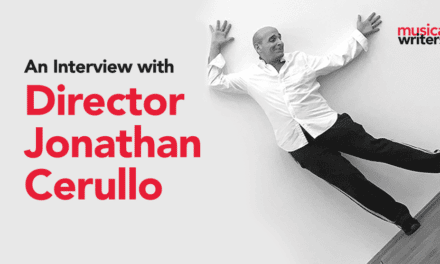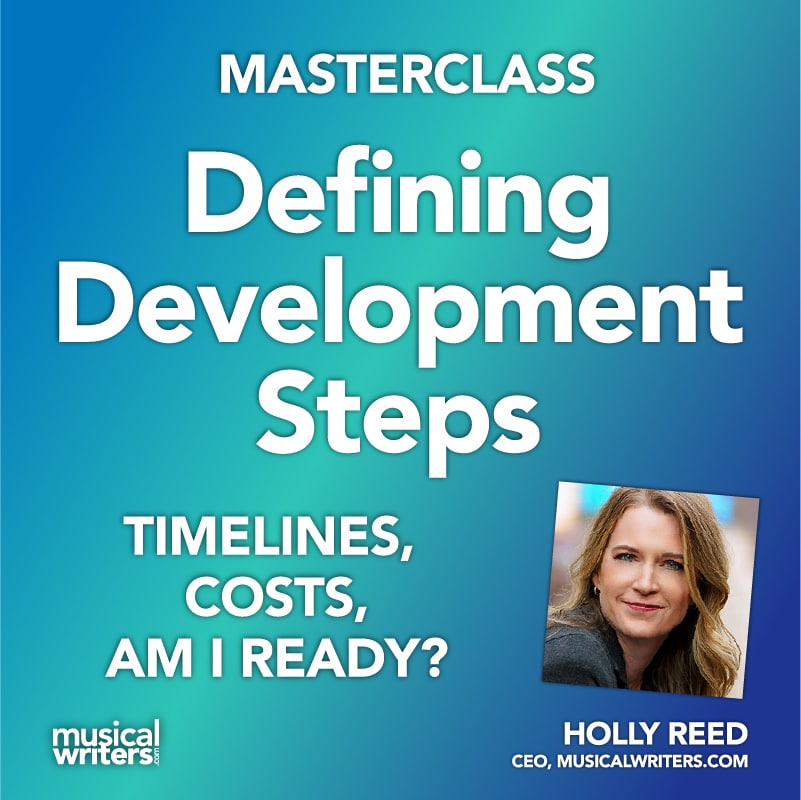A recent survey of our audience showed that around 30% of you are actively seeking producers and/or submitting your musical to competitions and festivals. I’m in that segment as well, and it ain’t easy. It takes a whole other vein of creativity, marketing prowess, aggressive networking, and unrelenting tenacity to grind through that particular step. It’s a lot of effort, so you want to be sure your show is ready before you embark on that challenging road.
See, it would be tragic to pitch and pitch and pitch (to no avail), THEN figure these things out. Because when you start re-pitching, it may fall on deaf ears.
It’s hard to put on the brakes. I remember talking to my friend Ken Davenport a few years ago about the musical I’m writing, and he said, “Holly, don’t market it yet!! I know marketing is your thing, but you’ve got to spend your time on the actual show right now.”
That was VERY good advice. Because it is my tendency to want to make big things happen in the lane I’m strongest at. But when I do get the attention of someone, my musical BETTER BE READY.
So before you get too far along in submitting your musical, let’s make sure you’re ready. Here are 3 things you need to have done before you start pitching your show.
1. Get full script reviews by at least 2 different industry pros.
After months—or most likely years—of slaving over a show that may have seemed untamable, unpresentable, and unfinishable, you’ve finally finished it!
The hard work is done and you’re ready to launch your new creation into the world, right?
Not just yet…
Just like children, our shows have spent a good length of time gestating—the inner parts, the outer parts, their vibrant personalities, and the unique things that make them tick.
But those beautiful creations aren’t ready to run the day they’re birthed. They need guidance. Discipline. Education. Correction.
Musicals are no different.
I’ve done coaching calls and script reviews with writers, and there have been several writers who felt their musical was ready to move forward. After asking a few basic questions, they quickly discovered that maybe they should give a little more attention to the nuts and bolts of story structure, character arcs, and song usage. Producers, Directors, and Artistic Directors are savvy. They do this every day, and they know what works and what doesn’t. Nothing can kill a submission faster (except bad formatting….see #2!) than the reader not knowing “whose story is it???”
Why do I need 2?
A little tip going forward: get multiple opinions. Don’t take one person’s perspective as absolute truth. Get multiple opinions, and when you start seeing the same issue come up from various sources, take note. That’s probably something you’re going to need to address.
Pitching is a little like going on a first date. It takes courage, you’ve got to be prepared, and you may only get one shot. Have a trusted professional make sure you’re not stepping out the door with your fly open or lipstick on your teeth.
Know someone who can review your script? Do it today. Need help? Check out our script review service here.
2. Make sure your musical is formatted correctly.
I asked a handful of Artistic Directors this question:
What is the #1 mistake people make when submitting musical material?
Here are a couple of the answers I received:
“Having a script properly formatted immediately lets the reader know that you’ve done your homework, you’ve read musicals in libretto form, you’ve found a way to be a part of the community (whether through professional theater or colleagues, or even community theater participation where you became familiar with a licensed libretto). When a script has none of this formatting, it suggests that the writer has looked only at their own computer without taking the time to research the artform thoroughly.”
~West Hyler, Producing Artistic Director, New York Musical Festival
“Not only will proper formatting help your work look more professional when submitting your musical to contests, festivals, theatres, and producers, but it will also make preparation and rehearsals much easier on your actors, musicians, directors, et al.”
~Joey Madia, Artistic Director, Seven Stories Theatre Company
In general, it just helps avoid headaches all around.
Ideally, you’re writing your musical in a dedicated script-writing software such as Final Draft, Celtx, or something similar. If you’re using Final Draft, we have a MusicalWriters Final Draft template to help you get started easily. If you’re using a different software, check out our Script Formatting Guide for details on how to set your margins, indents, fonts, etc.
Software-challenged? We can help! Check out our script formatting service here.
Of course, perfect formatting does not guarantee success. But presenting your material professionally and according to industry standards can set you apart and just might move your musical into the hands of a producer or director who will fall in love with your piece.
3. Write a concise synopsis and have a complete submission package.
A synopsis is a summary of a musical that familiarizes the reader (producers, investors, directors, theatres, agents, etc.) with the plot, characters, and placement of songs within your show.
Your musical synopsis should achieve two things. First, it should convey the basic plot and characters of your show. Secondly, it should be intriguing!
A musical synopsis will prove to be one of the most important selling pieces for your show. A well written (and formatted) synopsis can provide essential information about your musical in a bite-size document. If you can capture the attention of a producer, director, or investor with your synopsis, you’ve got them on the hook and have a much better chance at selling them on the whole musical. Moreover, if they are intrigued by the “bones” of the show, they know that the details (i.e., the rest of the script) can be worked out in development later.
A vast majority of musical submission opportunities require a 1-page synopsis. More often than not, your synopsis is the first thing someone will read from your submission packet.
It can be a great exercise to boil down your musical story into one page. It may even help iron out some story details you’ve been wrestling with. For some extra guidance on writing your synopsis, check out our worksheet “How To Create a Musical Synopsis.”
To have your complete package ready, prepare these documents for submissions:
- Cover Letter
- Synopsis
- Demo Recordings of 5-6 songs
- Cast/Character Breakdown
- Include gender, age, race, vocal range, and brief description of character and personality
- For vocal range, specify either voice part (such as tenor or mezzo) or give highest and lowest notes sung by the character across all songs
- Indicate possible or necessary doubling
- 10-page script sample
- Full script
- Full script – blind (no contact info anywhere)
- Writer bios
- Production/Development History
- Proof of secured rights (if applicable)
- Contact information
Are you documents a mess? We can polish them up.
Bonus: Create your show art, website and social media
Having show art, a website and/or a social media presence isn’t essential for pitching or submitting, but it does help give your musical a bit of “real estate” in the world.
Show Art
Don’t be concerned that your show art has to be what will go on the Broadway Playbill on opening night. We’ll cross that bridge when we get there. But have something…even if it’s just a title treatment. Your work is a product, and it will need its own branding. You can create this yourself, or depending on your budget and level of art you’re seeking, you can seek out freelance or professional designers.
Once built, use your show art on business cards, programs and ads for events, in the header of your submission materials, and (small) in your email signature in personal emails or using email systems such as MailChimp).
Website
A website is an easy way to bring your musical and its development to the public eye and allow you to interact with others from all over the world. It also legitimizes your show as being a “thing” and provides credibility and professionalism to your work.
A few ways to use your website:
- Give updates on development including press releases, articles, and photos
- Post song demos
- Show off great production photos
- Share your musical’s synopsis
- Post upcoming production or development dates
- Link to external accounts (YouTube, Soundcloud, Facebook, Instagram)
- Provide a contact form for those interested to get in touch with you
- Build an email list
There are many options when it comes to building a website. You can do a very simple DIY on sites such as Wix, or if you’re a little more savvy, you can experiment with WordPress themes and plugins. Or you can hire a professional web designer (like me!).
Social Media
Many people have a love/hate relationship with social media. Followers, stories, and hashtags, oh my! It can be overwhelming!
Social media requires a good deal of attention. The whole nature of it is it’s “social,” meaning there should be a decent level of constant engagement and interaction with your audience. Where a website can sit and look pretty and provide information, social media is meant for constant communication and relevant, current updates.
If you don’t have a good source of content (current production, collaborative development sessions, etc.) it might be good to wait a while to get moving on social. No presence is better than a dead presence.
But if you’ve got things happening, then by all means find your preferred social channels and let the world know what’s going on. Create your #ShowHashtag. Take photos during rehearsals. Share behind-the-scenes “sneak peeks” of costumes and sets. Have creative team, cast and crew members share updates on their social channels so you can repost. Share videos of rehearsal clips and interviews with cast (always get permission before posting).
Here’s a great article on using social to promote your events.
Be smart before moving forward in submitting your musical. It will pay off!
Pitching and submitting your musical is a daunting process and not for the faint of heart. One way to move forward confidently is to make smart choices early and ensure you have a solid show, polished submission package, and an online presence to establish you as a serious player in the industry.
If you haven’t done #1 and #2 on this list, do not pass GO, do not collect $200, and DO NOT submit your show yet. Be diligent to do the necessary preliminary work, then give yourself a green light to proceed. You’ll be glad you did!



















This is interesting advice. But to whom should you submit a script and score if you want a publisher to buy the musical? Does it need to go to production first, and, if so, does the Publisher need to see a film of the production?
This article is geared toward writers who are submitting their shows for developmental and production opportunities.
For licensing/publishing – you will want to make sure that your show has received many forms of feedback before you reach a finalized published version of the show: feedback from directors/producers – feedback from actors – and feedback from audiences.